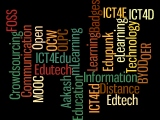Demystifying ICT4E Terminology: 10 Acronyms and Names You Should Know

Last week, amidst reading the various blogs and tweets for Open Education Week, I came across several acronyms that were unfamiliar. Terms like Edupunk and Aakash are just a few of the terms that you simply have to “be in the know” in order to know.
Anyone new to the field of information and communication technology for education (ICT4E) might be a little overwhelmed at first by the plethora of acronyms, terminology, and program and developer names that pervades internet searches and tweets. Whether you’re an education professional looking for new opportunities to use technology in a development project, or a seasoned ICT4D veteran exploring the new advances being made in open education, there’s usually a new term that pops up, sometimes coined at a recent conference, that might be unfamiliar.
And to complicate things further, common ICT4E terms are also used among the wider national education community, as well as those focused on content more than devices, devices more than quality, quality more than technology, and a small community of professionals that have enough experience to be able to see the overall picture.
So to offer some clarification, here are some ICT4E terms you should know:
- ICT4E: Information and Communication Technology for Education
Self-explanatory acronym though, within the Twittering world, it has taken on several other forms such as ICT4Ed, ICT4Edu, Edtech and Edutech. A recent blog from ICTWorks set out to clarify what is the most appropriate hashtag and it seems a consensus has been reached for ICT4E — at least for now.
- mLearning
mLearning is the use of mobile technology for education — both formal and informal. Though eLearning — using technology for in-class or distance learning purposes — could technically encompass mobile technology, mLearning has been gaining more ground and becoming increasingly popular with the rise of mobile phone saturation throughout the world — estimated at over 5.3 billion mobile subscribers during the UNESCO Mobile Learning Week — that it has created its own category and is the subject of many ICT4E debates.
-
OLPC: One Laptop Per Child
Commonly referenced and debated in the ICT4E sector, this controversial project has received a lot of praise and criticism for it’s device-based initiative which has introduced over 2.5 million laptops to schools throughout the developing world.
- Aakash
The new competitor to OLPC (though that too could be debated since OLPC has expressed support for this new project), this name tends to stir up some excitement among ICT4E advocates. Aakash is a new tablet computer recently priced at around $35 and already being used in public schools in India.
- BYOD: Bring Your Own Device
Bring Your Own Device is simply that — students using their own digital devices in the classroom. With many digital devices to choose from such as eReaders, tablets, and mobile phones, computers are no longer considered the only or best option. BYOD is a concept being explored more in connection to mLearning though there are few examples of it already being applied in a development context.
OERs are course and learning materials which can easily be accessed for learning, teaching and research purposes via the internet. Covered under open licenses, these resources can be modified and updated by multiple users creating “living” resources — those that have the ability to grow and adapt with new innovations, historical events, new perspectives, etc.
- OCW: Open CourseWare
OCWs are a type of OER. Simply put, they are the learning materials or collection of OERs organized to serve as course content. These, like OERs, are openly licensed and can be reused and reshaped so that they can be introduced in various educational settings.
- FOSS: Free and Open Source Software
Software that is both free and open source; an important tool for developing OERs.
- MOOC: Massive Open Online Course
Similar to OCWs except that their pedagogical theories and student base differ. A relatively recent innovation in online course development, MOOCs are founded on the theory of connectivism and facilitate learning through teacher led discussions and presentations and developing peer-to-peer networks between students.
- Badges
A digital representation equivalent to a certificate or diploma, badges certify the specific skills a student has attained and the quality of the instruction that they received from a specific educational institution.
-
Crowdsourcing
A distributed problem-solving and production process that involves outsourcing tasks to a network of people, usually many and undefined, and a great strategy for collaborating with other teachers and educational professionals.
And in the spirit of open education and crowdsourcing, feel free to share any other essential, humorous, or baffling ICT4E terminology you’ve come across.







































